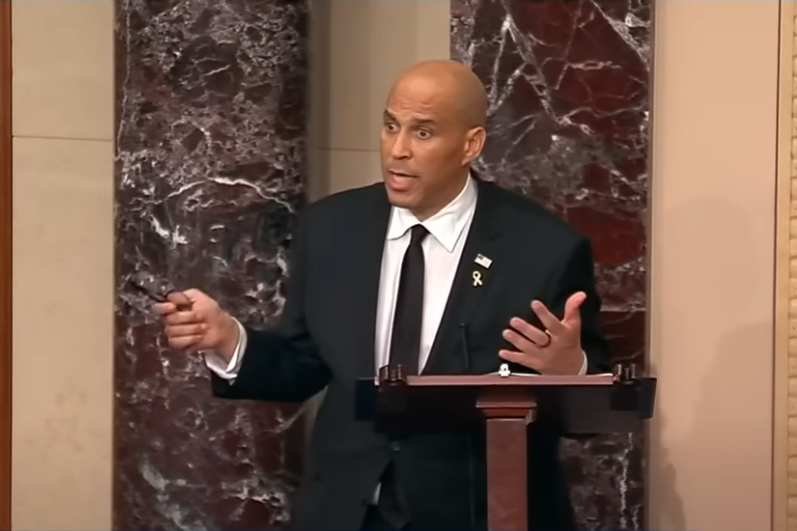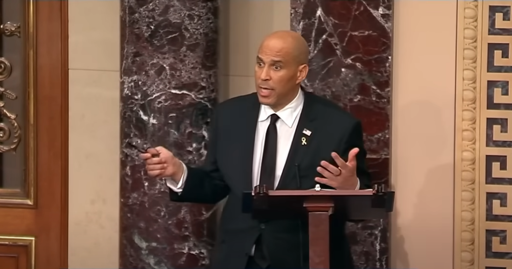 Photo: CSPAN
Photo: CSPAN
With the two parties very far apart on terms for a measure to keep the federal government open after funding runs out on September 30, the odds of at least a temporary government shutdown are soaring every day. You would normally think the party that controls the federal government top to bottom would get the bulk of the blame for this development. But Republicans will be very quick to point out that the shutdown, if it happens, will be triggered by a Democratic filibuster of a GOP-sponsored stopgap spending bill in the Senate.
Such a shutdown can end in three ways: There’s a compromise, which seems increasingly remote given the partisan political climate in the country; Democrats give up, which could them into deep trouble with their own highly combative base; or Republicans vote to nuke the legislative filibuster.
Just as a reminder, senators from each party have recently pursued the “nuclear option” to remove the right to filibuster executive-branch and lower federal-court confirmations (Democrats in 2013) and Supreme Court confirmations (Republicans in 2017). (For that matter, “reconciliation” bills like this year’s One Big Beautiful Bill Act, cannot be filibustered either.) But unless Republicans can find some clever way to carve out another limited exception to the power to filibuster legislation, overriding the kind of filibuster that’s peeking just over the horizon means killing it altogether.
How likely is that? It may depend on how badly Republicans want to reopen the federal government and/or return Congress to something resembling normal functioning; and just as importantly, what Donald Trump wants. Early in his first term, when Democrats were able to block key elements of his agenda, he loudly and repeatedly called for ending the filibuster altogether, a demand that then-Senate Majority Leader Mitch McConnell quietly but successfully resisted. Predictably Trump reversed himself when Democrats gained their own trifecta in 2021. He hasn’t publicly discussed it this year, though Republicans not-so-subtly weakened what was left of the filibuster by stretching the boundaries of reconciliation bills to include items normally considered off-limits. If Trump suddenly goes back to his 2017 position, it seems unlikely that today’s extremely submissive GOP Senate conference would defy him.
But now about Democrats? Should the risk of inviting Republicans to nuke the filibuster, taking away their most important leverage point in Congress, dissuade them from using it in this fight over temporary government funding? It’s not an easy question to answer. On the one hand, Democrats came pretty close to creating a major exemption to the filibuster for voting rights legislation in 2022. And on the campaign trail in 2024, Kamala Harris called for a similar “carve-out” for abortion rights legislation. In general, Senate Democrats have been more hostile to the filibuster — long associated with reactionary resistance to civil rights bills and other progressive legislation — than their Republican colleagues.
On the other hand, we are at a moment when many if not most Democrats fear the country is tipping towards authoritarianism in the hands of a president who respects no boundaries on his power; who regularly attacks the opposition party as despicably un-American and “radical;” and who is now trying to rig the 2026 midterm elections to maintain the near-total power he currently possesses. Giving up the one tool, however puny it sometimes seems, that they have to resist his power grabs is counter-intuitive. Democrats are also naturally loathe to admit the kind of complete powerlessness that would become evident if Republicans can accomplish absolutely everything they want via party-line votes in Congress.
So do Democrats abandon the filibuster on this occasion (maybe after a brief government shutdown designed to bare their teeth at Trump) in order to preserve it for a real emergency? Do they gamble that Republicans will want to keep it for their own future use? And more fundamentally does refusing to keep the federal government open really serve their purposes in dramatizing GOP malfeasance? As unified as Democrats are right now in refusing to just cave to Republicans on spending as they did in March, these questions won’t go away, and so the congressional chess game will continue with lots of collateral damage to federal programs and employees.
From Intelligencer - Daily News, Politics, Business, and Tech via this RSS feed

